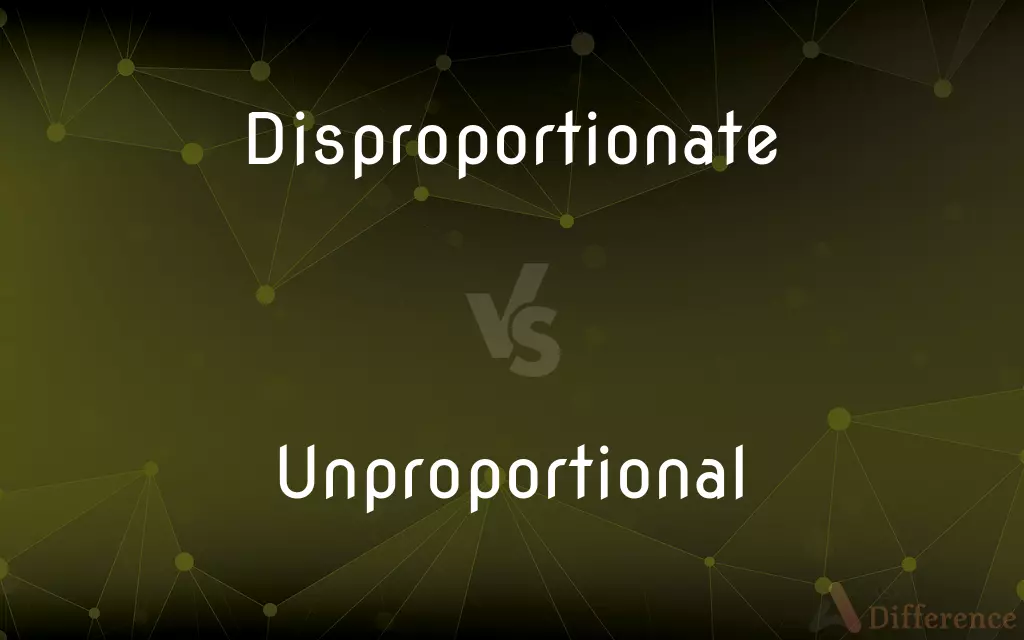Disproportionate vs. Unproportional — What's the Difference?
By Tayyaba Rehman — Published on October 23, 2023
"Disproportionate" refers to being out of proportion in relation to something else. "Unproportional" is less commonly used but means lacking correct proportion. Both describe unequal ratios but have different linguistic preferences.

Difference Between Disproportionate and Unproportional
Table of Contents
ADVERTISEMENT
Key Differences
"Disproportionate" and "Unproportional" both touch upon the theme of unequal or unbalanced ratios, but they are used in different contexts and frequencies. "Disproportionate" is a widely accepted and used term that describes something being out of proportion in comparison to something else. For instance, if one were to describe a punishment as disproportionate to the crime, they'd mean the severity of the punishment does not match the gravity of the crime committed.
Tayyaba Rehman
Oct 23, 2023
It's essential to be aware of these nuances when choosing which word to use. While both can be understood to mean something similar, "disproportionate" is more universally accepted and understood, making it the safer choice in most contexts.
Tayyaba Rehman
Oct 23, 2023
In literature and formal writing, "disproportionate" is often favored due to its established presence in the language. It is more likely to be encountered in scholarly articles, books, and official documents. "Unproportional" might be seen in more informal contexts, although even there, its use is rare.
Tayyaba Rehman
Oct 23, 2023
"Unproportional," on the other hand, is less commonly used in standard English. While it conveys a similar meaning, suggesting something lacks the correct or expected proportion, its usage is not as widespread. In many contexts, "disproportionate" would be the preferred term over "unproportional." This preference is often rooted in linguistic traditions and the flow of speech.
Tayyaba Rehman
Oct 23, 2023
Comparison Chart
Definition
Out of proportion in relation to something else.
Lacking correct proportion.
Tayyaba Rehman
Oct 23, 2023
ADVERTISEMENT
Linguistic Flow
Preferred in many linguistic contexts.
Not as smooth in many linguistic scenarios.
Tayyaba Rehman
Oct 23, 2023
Definitions
Disproportionate
Not in correct relation or balance to something else.
His reaction was disproportionate to the situation.
Tayyaba Rehman
Sep 26, 2023
ADVERTISEMENT
Unproportional
Not balanced or harmonious in relation to other parts.
The recipe's unproportional ingredients ruined the dish.
Tayyaba Rehman
Sep 26, 2023
Disproportionate
Exceeding what is usual or proper in relation to something else.
The penalties seemed disproportionate to the minor offense.
Tayyaba Rehman
Sep 26, 2023
Unproportional
Lacking the correct proportion or relationship in size, amount, etc.
The drawing's unproportional limbs made the character look odd.
Tayyaba Rehman
Sep 26, 2023
Disproportionate
Being unequal or out of balance.
There's a disproportionate number of males to females in the group.
Tayyaba Rehman
Sep 26, 2023
Unproportional
Deviating from what is proportional.
The building's unproportional design was jarring.
Tayyaba Rehman
Sep 26, 2023
Disproportionate
Misaligned with the expected or standard proportion.
The statue had a disproportionate head.
Tayyaba Rehman
Sep 26, 2023
Unproportional
Not maintaining the same proportion or relationship.
The unproportional growth rates raised concerns.
Tayyaba Rehman
Sep 26, 2023
Disproportionate
Not proportionate in terms of size, number, or degree.
The company's success received disproportionate media attention.
Tayyaba Rehman
Sep 26, 2023
Unproportional
Mismatched in terms of size, degree, or importance.
The reward seemed unproportional to the effort put in.
Tayyaba Rehman
Sep 26, 2023
Disproportionate
Not proportioned; unsymmetrical; unsuitable to something else in bulk, form, value, or extent; out of proportion; inadequate; as, in a perfect body none of the limbs are disproportionate; it is wisdom not to undertake a work disproportionate means.
Tayyaba Rehman
Jan 29, 2023
FAQs
Can "disproportionate" refer to both excessive and insufficient proportions?
Yes, it can refer to something being either too much or too little in relation to something else.
Tayyaba Rehman
Oct 23, 2023
Which is more common: disproportionate or unproportional?
"Disproportionate" is more commonly used than "unproportional."
Tayyaba Rehman
Oct 23, 2023
Do both words mean something is unbalanced?
Yes, both suggest a lack of balance or proper proportion.
Tayyaba Rehman
Oct 23, 2023
Can "unproportional" be used in formal writing?
While understandable, "disproportionate" is preferred in formal contexts.
Tayyaba Rehman
Oct 23, 2023
Is "unproportional" considered standard English?
It's less standard than "disproportionate" and is used less frequently.
Tayyaba Rehman
Oct 23, 2023
Author Spotlight

Written by
Tayyaba RehmanTayyaba Rehman is a distinguished writer, currently serving as a primary contributor to askdifference.com. As a researcher in semantics and etymology, Tayyaba's passion for the complexity of languages and their distinctions has found a perfect home on the platform. Tayyaba delves into the intricacies of language, distinguishing between commonly confused words and phrases, thereby providing clarity for readers worldwide.

















































